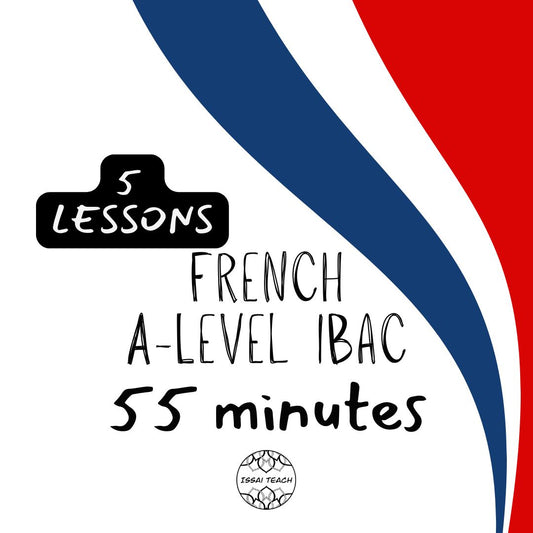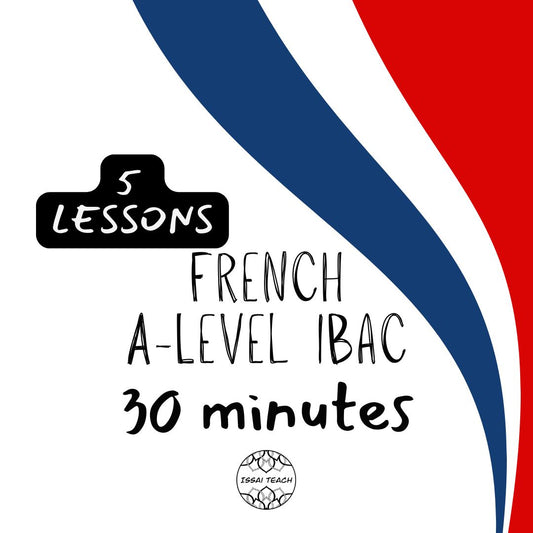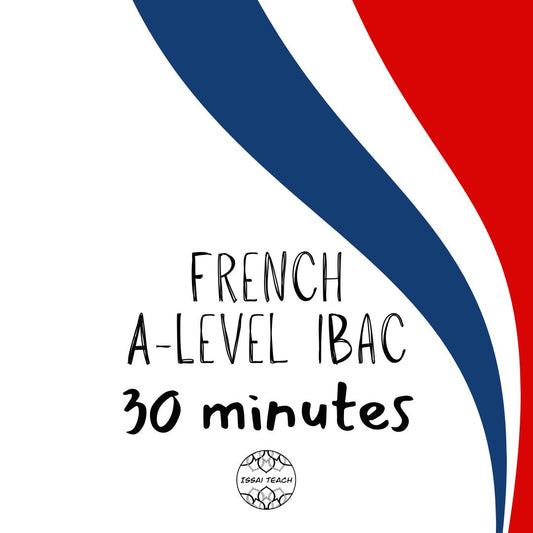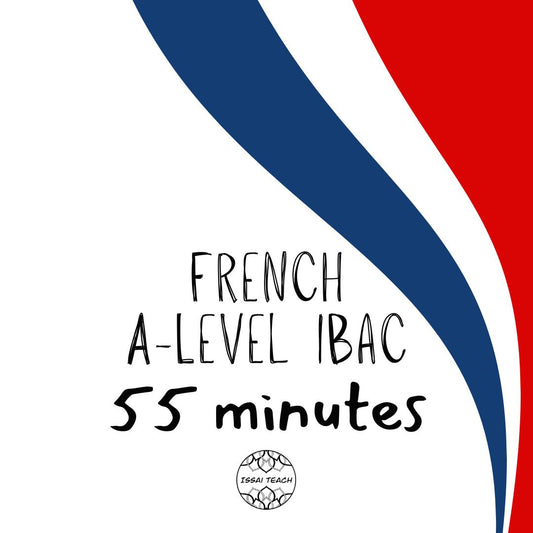French A-Level IBac Lessons
-
5 Lessons - French A-Level IBac Private Tuition 55-Minutes
Regular price £140.00 GBPRegular priceUnit price / per£150.00 GBPSale price £140.00 GBPSale -
5 Lessons - French A-Level IBac Private Tuition 30-Minutes
Regular price £70.00 GBPRegular priceUnit price / per£75.00 GBPSale price £70.00 GBPSale -
French A-Level IBac Private Tuition 30-Minutes
Regular price £15.00 GBPRegular priceUnit price / per -
French A-Level IBac Private Tuition 55-Minutes
Regular price £30.00 GBPRegular priceUnit price / per
French A-Level (2016)
The A-Level French exam in the UK is designed to assess not only your proficiency in the language but also your cultural understanding of French-speaking countries. While the core aims remain consistent across the different exam boards, there are subtle differences in format and emphasis. This guide will help you navigate the exam’s expectations and tailor your revision strategy accordingly.
The 2016 A-Level French Curriculum in the UK
What You’ll Be Studying
Under the 2016 curriculum, your studies will focus on:
- Language Skills: Listening, reading, writing, and speaking.
- Translation: Both from French to English and vice versa.
- Cultural Awareness: Insights into contemporary French society, history, art, literature, and current events.
The curriculum is designed to test both your practical language abilities and your understanding of French culture. It encourages a balanced approach, combining language practice with cultural study.
Understanding the Exam Boards
In the UK, most schools and colleges offer A-Level French through one of three main exam boards: AQA, Edexcel, and OCR. Each board follows the 2016 curriculum but has its own format and assessment style.
AQA (Assessment and Qualifications Alliance)
-
Structure: Typically divides the exam into three components:
- Paper 1: Listening and Reading Comprehension
- Paper 2: Writing and Translation
- Paper 3: Speaking
- Focus: AQA often emphasises clear written and spoken expression and expects students to demonstrate an understanding of cultural context.
- Tip: Practice with AQA past papers to become familiar with question phrasing and time management.
Edexcel
- Structure: Similar to AQA, Edexcel usually splits the exam into two or three papers covering receptive skills (listening and reading) and productive skills (writing and speaking), with translation elements integrated.
- Focus: Edexcel places strong emphasis on the integration of language skills with cultural knowledge. You’ll be expected to interpret authentic texts and audio materials.
- Tip: Use Edexcel-specific revision guides and mark schemes to understand the expectations in translations and essay responses.
OCR (Oxford Cambridge and RSA Examinations)
- Structure: OCR typically offers a two-paper structure (for listening/reading and writing/translation) plus a separate speaking test.
- Focus: OCR is known for testing practical language use in everyday contexts alongside formal language tasks.
- Tip: Review OCR’s sample materials and examiner reports to get insight into common pitfalls and effective strategies.
Note:
Always check the latest specifications from your exam board, as minor updates or adjustments may have been introduced after the 2016 curriculum was implemented.
Exam Structure and What to Expect
Although there are board-specific differences, the overall structure of the French A-Level exam under the 2016 curriculum typically includes:
Listening and Reading Comprehension
-
Listening:
- Audio recordings such as interviews, news reports, or everyday conversations.
- Questions will test your ability to understand gist, details, and implied meanings.
-
Reading:
- A range of texts including articles, short stories, and advertisements.
- Tasks include extracting information, summarizing content, and interpreting cultural references.
Writing and Translation
-
Translation Tasks:
- Translate short texts from French to English and vice versa.
- Demonstrate your command of vocabulary, idiomatic expressions, and grammar.
-
Writing Tasks:
- Compose essays, reports, or informal letters.
- Focus on clarity, coherence, and the ability to argue or describe effectively.
Speaking (Oral Exam)
-
Format:
- A one-to-one conversation with an examiner or a structured presentation followed by questions.
- Assessments focus on pronunciation, fluency, accuracy, and the ability to discuss cultural topics.
-
Preparation:
- Practice spontaneous speaking and prepare notes on common themes in French culture and society.
Key Topics and Skills for the 2016 Curriculum
Language Skills
-
Grammar and Vocabulary:
- Master verb tenses (including the subjunctive and conditional), complex sentence structures, and advanced vocabulary.
-
Translation Techniques:
- Learn to balance literal translation with conveying contextual meaning.
-
Writing Skills:
- Develop structured responses with clear introductions, arguments, and conclusions.
-
Listening and Reading:
- Regularly engage with authentic French materials—films, radio, newspapers, and literature.
Cultural Awareness
-
Contemporary French Issues:
- Be aware of social, political, and environmental topics in French society.
-
Art and Literature:
- Understand references to French art, literature, and historical events that may appear in exam texts.
-
Current Affairs:
- Keeping up-to-date with current events in France and Francophone countries can enrich your responses, especially in the speaking exam.
Effective Preparation Strategies
Creating a Study Plan
-
Start Early:
- Develop a revision schedule that allocates time for all components: listening, reading, writing, translation, and speaking.
-
Balance Your Revision:
- Alternate between language practice (grammar exercises, vocabulary drills) and cultural study (reading articles, watching French films).
Using Past Papers and Board-Specific Resources
-
Past Papers:
- Work through past papers from your specific exam board (AQA, Edexcel, or OCR) to familiarise yourself with exam formats and time constraints.
-
Revision Guides:
- Invest in revision guides tailored to your board’s specifications.
-
Online Resources:
- Utilise websites, language apps (like Duolingo or Memrise), and YouTube channels that focus on A-Level French topics.
Practicing Speaking
-
Language Exchanges:
- Partner with classmates or join language exchange groups.
-
Mock Exams:
- Simulate the speaking exam environment by practicing with teachers or tutors.
-
Record Yourself:
- Listen to your recordings to identify areas for improvement in pronunciation and fluency.
Exam Day Tips
Before the Exam
-
Rest and Nutrition:
- Get a good night’s sleep and have a healthy meal to keep your energy levels up.
-
Arrive Early:
- Give yourself plenty of time to settle in, review any last-minute notes, and calm your nerves.
-
Check Essentials:
- Bring all necessary materials (pens, pencils, an approved dictionary if allowed, etc.) as specified by your exam board.
During the Exam
-
Read Instructions Carefully:
- Take time to understand what each question requires.
-
Time Management:
- Allocate your time wisely for each section to avoid rushing.
-
Stay Calm:
- If you encounter a challenging question, move on and come back to it if time permits.
Success in the 2016 A-Level French exam lies in understanding the structure and expectations of your chosen exam board, mastering both language and cultural content, and developing a consistent and well-rounded study plan. By familiarising yourself with the formats of AQA, Edexcel, or OCR and practicing regularly with targeted resources, you can approach your exam with confidence.
Remember, the key is to start your revision early, practice actively, and always relate your language skills back to the cultural context—an essential aspect of the A-Level French curriculum.
Bonne chance! With determination and the right strategies, you’ll be well-prepared to excel in your French A-Level exam.




